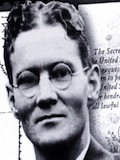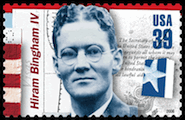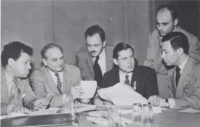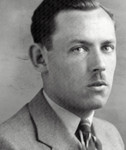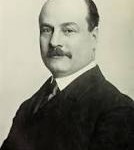Hiram (Harry) Bingham IV (1903-1988) played a crucial role in the underground network led by Varian Fry that rescued Jewish and other refugees from Vichy France.
Bingham’s father, Hiram Bingham III, was the archaeologist who in 1911 discovered the lost Inca city of Machu Picchu, in Peru, and upon whom Steven Spielberg in part based his famous movie character, Indiana Jones. Bingham later served as governor of Connecticut and as United States Senator from the nutmeg state. Harry chose to enter the diplomatic service, and in 1939 was posted as a U.S vice-consul in Marseilles, France.
In the summer of 1940, an American author and editor, Varian Fry, arrived in France on a one-man mission to rescue artists and intellectuals, most of them Jews, from the pro-Nazi Vichy government. Defying their superiors, Bingham and another vice consul, Myles Standish, secretly cooperated with Fry. The pair managed to issue visas and travel documents that saved the lives of an estimated 2,500 refugees, among them the painter Marc Chagall, Nobel Laureate Otto Meyerhof, and the philosopher Hannah Arendt.
Bingham and Standish arranged for the famous German Jewish novelist Lion Feuchtwanger to be smuggled out of an internment camp disguised in women’s clothing, and Bingham personally hid Feuchtwanger in his home until he could secret him out of the country.
In another episode, a number of British pilots who escaped from the Germans were detained by the Vichy French. The U.S. consul-general in Marseilles, Hugh Fullerton, sent Bingham to the [French] internment camp, but not to seek their release. “We were not supposed to help them at all,” Bingham recalled in a postwar interview. “The Consul General told me to tell the French manager, the general in charge of the camp, that we were not interested, that we were glad they were holding them so they couldn’t get back to England.” But when Bingham arrived, the general assumed he had come to ask for the British pilots’ freedom, so he immediately offered to let them “escape,” before Bingham said anything. Fry and Bingham proceeded to smuggle them out of France in the months to follow.
Bingham was knowingly endangering himself. If the State Department discovered what he was doing, his career would be ruined. Physical danger was also a possibility; having diplomatic status was no guarantee of safety under the Nazis. The Czech consul in Marseilles, Vladimir Vochoc, was jailed by the Vichy authorities for helping anti-Nazi activists flee France, and spent two months in prison before he managed to escape. The Brazilian ambassador to France, Luis de Souza Dantas, was arrested by the Nazis in 1943 for issuing visas to refugees, and was deported to Germany. The Mexican consul-general in Paris, Gilberto Bosques, was arrested and placed under house arrest because of his efforts to help Jewish refugees.
Word of the Fry-Bingham rescue effort began to spread, and furious Nazi officials complained to the State Department. Anxious to avoid irritating American-German relations, the Roosevelt administration in early 1941 revoked Fry’s passport, bringing the rescue campaign to halt. The State Department transferred Bingham, first to Lisbon and then out of the European theater to the U.S. embassy in Argentina. There Bingham further jeopardized his diplomatic career by challenging the State Department’s reluctance to intervene against Argentinean harboring of Nazi war criminals. As a result, he was unofficially barred from advancing to the rank of ambassador. Discouraged, Bingham resigned from the foreign service.
Bingham’s eleven children were unaware of the details of his refugee rescue work until, several years after his death, his youngest son, William, discovered a bundle of letters and other documents about the Vichy episode behind an old linen closet in the family home. The papers revealed the incredible story of Harry Bingham’s rescue work.
In 2005, the State Department posthumously conferred on Bingham its “Constructive Dissent” award, and in 2006 the U.S. Postal Service issued a stamp bearing Bingham’s likeness.
Sources: Marino, A Quiet American, pp.99-100, 271-272;
Fry, Surrender on Demand, pp.10-12, 87-89.



